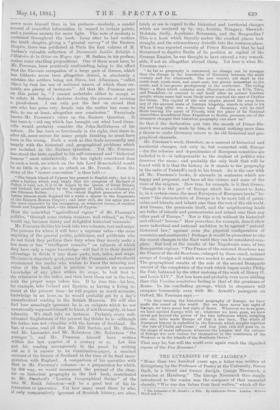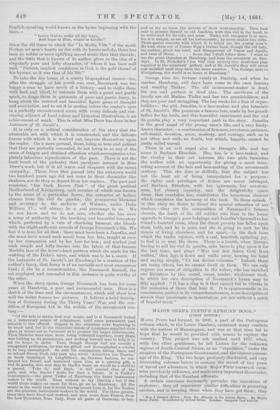THE LUTANISTE OF ST. JACOBI'S.* "Mont: than two hundred years
ago, a letter was written at Konigsberg by the Professor of Poetry at the University, Simon Dach, to a friend and former disciple, George Neumarck, a musician at Hamburg." The George Neumarck thus simply introduced to the reader was the composer of that immortal• chorale, "Wer nur den Hebei). Gott liisst wethen," which all the
• The Lutattiela of St. Jacobi' : a Tale. By Catharine Drew. London : hlaraus. Ward and Co.
English-speaking world knows as the hymn beginning with the lines,— " Leave God to order all thy ways, And hope in Him, whate'er betide."
Since the old times in which the "In Media Vita" of the monk Notken set men's hearts on fire with its heroic melody, there has been no nobler or more uplifting sacred music than that chorale ; and the little that is known of its author gives us the idea of a singularly pure and lofty character, of whom it has been well said, "Patient, implicit confidence in God, is the gold thread of his hymns, as it was that of his life."
To take the dry bones of a scanty biographical record—for, after the struggle of his youth was over, Neumarck was too happy a man to have much of a history—and to clothe them with flesh and blood, to animate them with a great and gentle spirit, to drape them in garments of pure and poetic fancy, to hang about the restored and beautiful figure gems of thought and association, and to set it in motion before the reader's eyes in a perfectly reconstructed scene, with every delicate and con- vincing adjunct of local colour and historical illustration, is an achievement of mark. This is what Miss Drew has done in her Lutaniste of St. Jacobi's.
It is only on a critical consideration of the story that the admirable art with which it is constructed, and the delicate finesse with which it is worked out, impress themselves upon the reader. On a mere perusal, these, being so true and patient that they are perfectly concealed, do not bring to us any of the sense of fatigue and strained attention which accompanies a too plainly laborious reproduction of the past. There is not the least touch of the pedantry that paralyses interest in Miss Drew's work, but it is all warm and eloquent with the rarest sympathy. These lives that passed into the unknown world two hundred years ago did not come to their chronicler like shadows, nor do they so depart from her readers. The poet and musician, " the Dark Brown Pink " of the great poetical Brotherhood of Konigsberg, each member of which was known by the name of a particular flower, the extractor of holiest strains from the viol da gamba; the prosperous librarian and secretary to the archives at Weimar, under Duke William IV., will always be a real personage to us. Wo do not know, and we do not care, whether she has even a scrap of authority for the touching and beautiful love-story which, perfected by a vein of charming humour, she blends with the slight authentic records of George Neumarck's life. We feel it is true, for all that ; there must have been a Janotha, and she must have wooed such music from her lute, taught at once by her companion and by her love for him ; and worked just such simple and lofty fancies into the fabric of that famous Mechlin lace of the lover's-knot pattern which she made for the wedding of the Duke's niece, and which was to be a secret. If the Lutaniste of St. Jacobi's (at Hamburg) be a creation of the author's fancy, that fancy is of an enviable and most uncommon kind ; if she be a reconstruction, like Neumarck himself, the art employed and concealed in this instance is quite worthy of the other.
When the story opens, George Neumarck has been for some years at Hamburg, a poor and unsuccessful man. Here is a sketch of the time and the circumstances, which will show how well the writer frames her pictures. It follows a brief descrip-
tion of Germany during the Thirty Years' War, and the con- dition of European Art in the middle of the seventeenth cen-
tury :—
" Of the arts to revive first was music, and to it Neumarck looked as a temporary means of subsistence, until some permanent post suitable to him offered. Organs in the churches were beginning to be much used, but in the meantime bands of musicians supplied their place in towns not so fortunate as to possess the larger instruments. Then libraries were once more being collected together, every State was looking up its possessions, and seeking learned men to help it to set its house in order. Thus, though George had not exactly a recognised profession, he was too gifted and accomplished a scholar to be long unemployed. So said his companions, taking leave, and so echoed Simon Dach (the poet who wrote 'Aennchen von Tharau,' so finely translated by Longfellow), as, Gorman fashion, he em- braced his friend, and bestowed upon him, as a parting gift, a viol da gamba, that was dear to Dach's heart as would be a child to a parent. Take it,' said Dach, it will remind thee of the past, and, who knows ? make for thee a future. It is Tiolko's mesterpieeo,—the great Tielke of Hamburg, the finest instrument maker in the world. Thou wishest to try Dantsig ; but if the world there makes no room for thee, go on to Hamburg. All the music in the world that is worth having comes from it, for the Tiolkes are the greatest instrument-makers in the world. For three genera- tions they have lived and worked, and men come from France, from the Low Countries, from Italy, from all parts of Germany, to buy,
and to try to learn the secrets of their workmanship. Thou hest only to present thyself to old Joachim, with this viol in thy hand, to be welcomed for its sake and mine. Tielke will recognise it at once, for it is unique, as are all his instruments; he never makes two alike. Those quaint conceits with which it is inlaid are the young man's. He took them out of Cesare Ripa's Italian book, though the old lady, his mother, shook her head, and disapproved of Venus and Apollo, and even of Diana Some day I shall follow thee. I want to see the great churches at Hamburg, and hear the minstrels on Sun- days. In St. Nicholas's I am told that seventy-five musicians play together in the minstrels' gallery, and at St. Jacobi's they will never rest satisfied until they have the same number. Yes, George, next to KOnigsberg, the world is at home at Hamburg."
George tries his fortune vainly at Dantzig, and when he reaches Hamburg, evil days have come to the once famous and wealthy Tielkes. The old instrument-maker is dead, his son and partner is dead also. The survivors of the family are old Madam Tielke and her two grandchildren, and they are poor and struggling. The boy works for a firm of organ- builders ; the girl, Janotha, is a lace-maker, and also lutaniste of St. Jacobi's. She possesses a famous lute, made by her grand- father for his bride, and this beautiful instrument and the viol da gamba play a very important part in the story. Janotha is the good angel of the young man's life, and a very finely- drawn character,—a combination of firmness, sweetness, patience; self-denial, devotion, sense, modesty, and courage, such as is not often met with, no doubt, but which, happily, cannot be justly called unreal.
There is an evil angel also in George's life, and her name is Barbara Etterlein. She, too, is a lace-maker, and the rivalry in their art between the two girls furnishes the author with an opportunity for giving a most inter- esting account of the lace and lace-making of the seventeenth century. This she does so skilfully, that the subject has not the least air of being interpolated for a purpose ; the rights and privileges of fiction are never infringed,
and Barbara Etterlein, with her ignorance, her covetous- ness, her clumsy coquetry, and the delightfully comic doom that overtakes her, contributes the humorous eleirigni
which completes the harmony of the book. To three episodi. in this story we desire to direct the special attention of our readers,—they are the composition of Neumarck's famous chorale, the death of the old cobbler who lives in the house opposite to George's poor lodgings, and Janotha's farewell to her
friend's deserted room, when the direst poverty has fallen upon )\1/4,
them both, and he is gone, and she is going to seek for the means of living elsewhere, and far apart,—in the dark hour which the reader rejoices, with a real, heartfelt, agitating joy, to find is so near the dawn. There is a fourth, when George, having to sell his viol da gamba, asks leave to play upon it for the last time, and plays " Wer nur den lichen Gott Nest walten," then lays it down and walks away, bowing his head and saying simply, " Ut fiat divina voluntas." Indeed, there are many others, but we cannot dwell on them, We can only express our sense of obligation to the writer, who has enriched our literature by this sound, sweet, tender, wholesome book, to which her own description of Neumarck's hymn may be fitly applied : " It has a ring in it that cannot fail to vibrato in the memories of those that hear it. 1t is epigrammatic in its conciseness, perfect in its comprehensiveness, more descriptive of sorrow than passionate in lamentation, yet not without a spirit of hopeful trust."







































 Previous page
Previous page